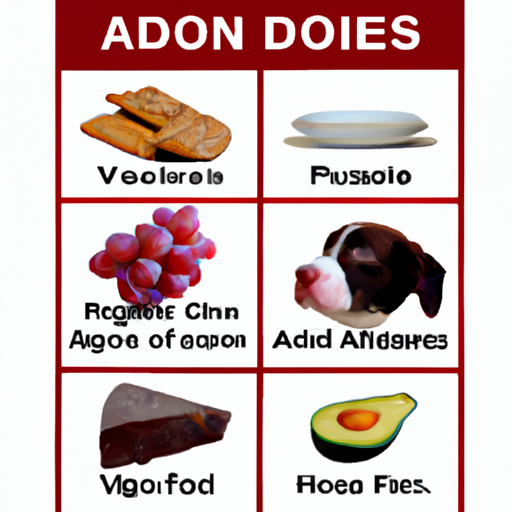As a dog parent, you are constantly on alert to ensure your furry friend is healthy and happy. One of the key aspects to their well-being is their diet. Knowing what is safe for your dog to consume is half the battle. However, it’s equally important to be aware of the dangerous foods that can harm your beloved pet. This article will provide a comprehensive guide on the foods that pose a risk to your dog’s health.
Foods to Avoid
Your kitchen pantry may be stocked with foods that are harmful to dogs. Here are some of the most common foods that you should keep out of your dog’s reach:
- Chocolate
- Coffee
- Alcohol
- Grapes and Raisins
- Onions and Garlic
- Avocado
- Certain Artificial Sweeteners (Xylitol)
- Macadamia Nuts
The Dangers of Chocolate and Coffee
Both chocolate and coffee contain substances called methylxanthines, specifically theobromine in chocolate and caffeine in coffee. These can cause vomiting, diarrhea, panting, abnormal heart rhythm, seizures, and even death in dogs. Dark chocolate, baking chocolate, and cocoa powder are particularly dangerous due to their high levels of theobromine.
The Risks of Alcohol
Alcohol and foods containing alcohol can cause vomiting, diarrhea, decreased coordination, central nervous system depression, difficulty breathing, tremors, abnormal blood acidity, coma, and even death. Even a small amount can lead to severe poisoning in dogs.
The Hazard of Grapes and Raisins
Grapes and raisins can cause rapid kidney failure in dogs. Even a small amount can make a dog sick. Repeated vomiting and hyperactivity are early signs.
The Peril of Onions and Garlic
Onions, garlic, chives, and other plants in the Allium family are poisonous to dogs in any form, whether raw, cooked, or in powder form. They can cause damage to the red blood cells leading to anemia.
The Danger of Avocado
Avocado contains Persin, a toxin that can cause vomiting and diarrhea in dogs. Also, the large seed poses a choking risk or can cause blockage in the digestive tract.
The Threat of Xylitol
Xylitol, an artificial sweetener found in many sugar-free products, can cause insulin release leading to liver failure, seizures, and brain damage in dogs.
The Risk of Macadamia Nuts
Macadamia nuts can cause weakness, vomiting, tremors, and hyperthermia in dogs. Symptoms usually appear within 12 hours of ingestion and can last approximately 12 to 48 hours.
How to Respond to Accidental Ingestion
If your dog accidentally ingests any of these harmful foods, it’s crucial to act immediately.
- Don’t panic – Keep calm and make sure your dog is safe and comfortable.
- Contact your vet – Get in touch with your local vet immediately. If it’s outside office hours, call an emergency vet clinic.
- Follow their advice – They may advise you to monitor your dog for symptoms or bring them in for a check-up.
Prevention is Better than Cure
The best way to keep your dog safe from harmful foods is to practice prevention. Here are some tips to help you:
- Keep hazardous foods out of your dog’s reach.
- Train your dog not to accept food from strangers.
- Educate your children about what foods are harmful to dogs.
- Always check with your vet before introducing new foods to your dog’s diet.
Frequently Asked Questions
Q: Can my dog eat any chocolate or coffee at all?
No, it’s best to keep your dog away from chocolate and coffee in all forms.
Q: Can I give my dog a small amount of alcohol?
No, even a small amount of alcohol can lead to severe poisoning in dogs.
Q: Is it safe for my dog to eat a small piece of onion or garlic?
No, onions and garlic are harmful to dogs in any form and quantity.
Q: Can I give my dog avocado without the seed?
Even without the seed, avocados contain a toxin called Persin which can harm your dog.
Q: Are all artificial sweeteners dangerous for dogs?
Not all artificial sweeteners are harmful to dogs, but Xylitol, in particular, can be deadly. Always check the ingredient list of any food product you plan to give your dog.



